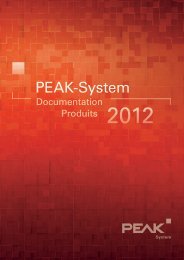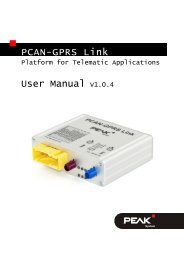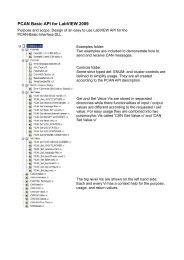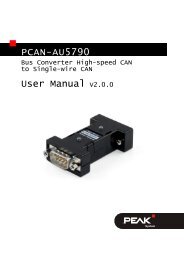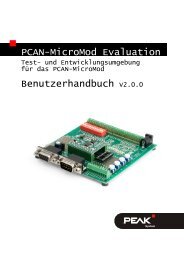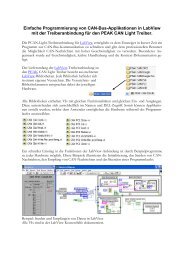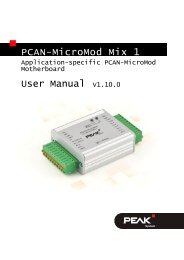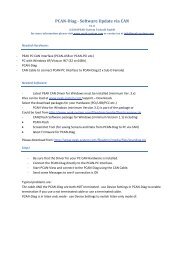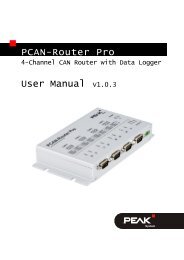1 PLIN-API Documentation - PEAK-System
1 PLIN-API Documentation - PEAK-System
1 PLIN-API Documentation - PEAK-System
You also want an ePaper? Increase the reach of your titles
YUMPU automatically turns print PDFs into web optimized ePapers that Google loves.
3.6 Handling of Schedule Tables by the <strong>PLIN</strong> <strong>API</strong> <strong>Documentation</strong><br />
3.6 Handling of Schedule Tables by the<br />
Hardware<br />
The LIN-Master can independently process a Schedule Table. During the operation of the schedule is not possible to send<br />
direct messages to the bus using the function LIN_Write ( see page 115). The Schedule Table determines the time<br />
behavior of the Bus while the Scheduler is working. The Frame Entry Table (FrameId) determines how the IDs are<br />
constructed (the direction, length, etc).<br />
There are 5 types of Slots in disposal to construct a Schedule Table, which is an array of single Slots. The hardware dealt<br />
with the table from index X to index X+1. The element 0 of the array contains the first Slot of the table. The Scheduler starts<br />
the process again dealing with the first Slot when the last Slot contained in the array was processed. The Slots contain the<br />
IDs without parity bits. The parity bits will be designated by the hardware at runtime. The smallest delay from one slot to<br />
another is 4 milliseconds. This corresponds to a frame of length 1 by 20 KBit/s. The biggest delay that can be configured is<br />
65535 milliseconds.<br />
Slot Types<br />
Unconditional Slots<br />
The hardware sends always a Header with the ID "FrameId [0]". It will take "Delay" milliseconds to the next entry.<br />
Event Slots<br />
The hardware sends always a Header with the ID "FrameId [0]". It will take "Delay" milliseconds to the next entry. The ID is<br />
the collision-ID of the event frame. In this slot are basically three types of Response possible:<br />
• If no Slave sends, the client application receives the Frame without response.<br />
• If a Slave sends, the client application receives the Frame with the response from the slave.<br />
• If two or more Slaves send, a collision occurs. The client application receives a Frame with Timeout. The hardware<br />
recognizes the collision, and automatically branche to the Schedule Table indicated in the slot member "CountResolve".<br />
This Resolve-Schedule contains the Unconditional IDs for the resolution of the collision.<br />
Sporadic Slots<br />
The hardware sends a Header only when a Frame of the list contains new data. The update of the data is done using the<br />
function LIN_UpdateByteArray ( see page 127). It will take "Delay" milliseconds to the next entry. A sporadic frame is<br />
similar to a single shot in slave mode. The response will be retransmitted until success. The internal update flag will be<br />
cleared when the transmission was error-free. Otherwise pending responses could be lost. In this slot are basically three<br />
types of Frames possible:<br />
• If there is no ID with new data, then no Frame will be sent. The client application does not receive a message.<br />
• If there is an ID with new data, those will be sent together with a Header, so that the client application gets a message.<br />
• If more than one ID have new data, the ID with the smaller List Index will be sent. "FrameId [0]" has the highest priority<br />
and "FrameId[7] the lowest. If the Scheduler passes through this Slot in the next iteration, it will be sent again until all<br />
requests are processed according to their priority.<br />
Diagnose Master Request Slot<br />
The hardware sends a Header only when the ID 60 contains new data. This behavior is similar to the Sporadic slot. It will<br />
take "Delay" milliseconds to the next entry. A Header will not be be sent if there is no new data. In this case a client<br />
application will not receives any message. The response will be retransmitted until success. The internal update flag will be<br />
cleared when the transmission was error-free. Otherwise pending responses could be lost.<br />
Diagnose Slave Response Slot<br />
20<br />
3



![English - Low Quality [7.2 MB] - PEAK-System](https://img.yumpu.com/5931738/1/184x260/english-low-quality-72-mb-peak-system.jpg?quality=85)
